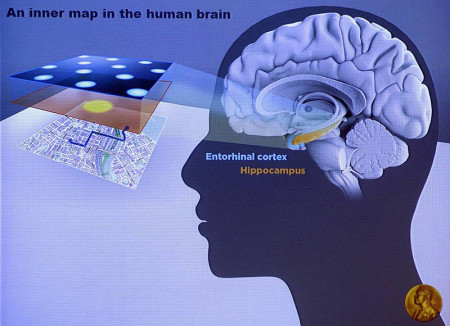I always thought the main function of the hippocampus was to convert short-term memory into long-term memory. It’s one of the first regions of the brain damaged by Alzheimer’s. If your spouse can’t remember something you discussed 20 minutes ago, you start to worry.
The hippocampus also plays an important role in spatial memory and navigation. That’s why you unfortunately hear of Alzheimer’s patients wandering away from home and not being able to find their way back.
A recent JAMA article, Nobel Prize Winners’ Research Relates to Brain Function and Neurodegenerative Diseases, describes the hippocamcus as our inner GPS. Place cells in the hippocampus (discovered in the 1970s) are associated with locations (even if you’re just thinking about a location), and grid cells (discovered in 2005) create triangular grids that function as a positioning system in space.
Together, place and grid cells allow animals to determine their position and to navigate through their surroundings much like an inner GPS.
Jamais vu: I’ve never seen that before
This is of particular interest to me because I used to experience a condition I self-diagnosed as jamais vu. Everything would seem normal when I woke up and moved around the house. As soon as I went outside, however, the surroundings were familiar, but I had no visual map of how to get from point A to point B, a trip I made almost every day.
The first time this happened, I was riding a bicycle (it’s much worse when driving a car). As I anticipated the next intersection, I didn’t know which way I should turn. As soon as I got to the corner, however, I would choose the right direction.
It’s a rather unnerving sensation, and I’ve never found a satisfactory explanation. Perhaps it had to do with brain cells in my hippocampus that function as a GPS. Or perhaps it wasn’t jamais vu. Most descriptions I’ve read of jamais vu are not about navigation, and they’re associated with epilepsy and amnesia. I wonder if there are others out there who have experienced this type of temporary memory disturbance, limited to the loss of navigational ability.
For an interesting case of jamais vu‘s apparent opposite — déjà vu (already seen) — there’s an article in New Scientist on an individual with a continuous and incapacitating sense of déjà vu. The article suggests a different location in the brain that might explain jamais vu and déjà vu: “The general theory is that there’s a misfiring of neurons in the temporal lobes – which deal with recollection and familiarity.”
GPS: Never having to know where you are
Nicholas Carr, in his latest book The Glass Cage, writes about how information technology alters our behavior. For example: “Social networks push us to present ourselves in ways that conform to the interests and prejudices of the companies that run them.” Perhaps digital technologies even alter our brains. He speculates that constant reliance on the GPS in our phones may increase early dementia. I don’t believe there’s evidence for that yet, but I did appreciate the wistfulness of this comment:
[To] never confront the possibility of getting lost is to live in a state of perpetual dislocation. … [You] never have to know where you are.
Related posts:
The ethics of a neuroenhanced future
Image source: Agencia de Noticias
References:
Tracy Hampton, Nobel Prize Winners’ Research Relates to Brain Function and Neurodegenerative Diseases, JAMA, December 17, 2014, Vol 312, No 23, pp 2477-2479 ($)
Helen Thomson, Oh no, it’s déjà vu all over again … and again, New Scientist, December 20, 2014, p 8 (OA)
Nicholas Carr, The Glass Cage: Automation and Us



Sorry, comments are closed for this post.